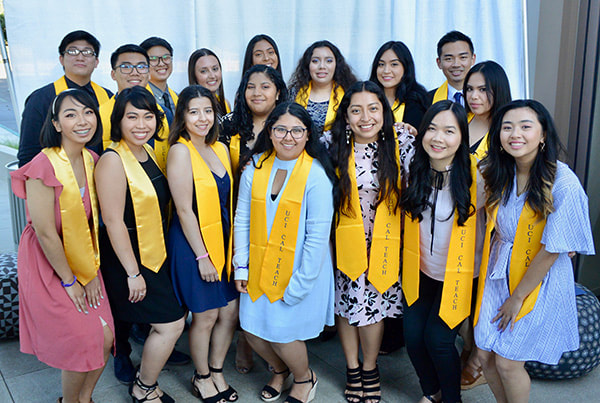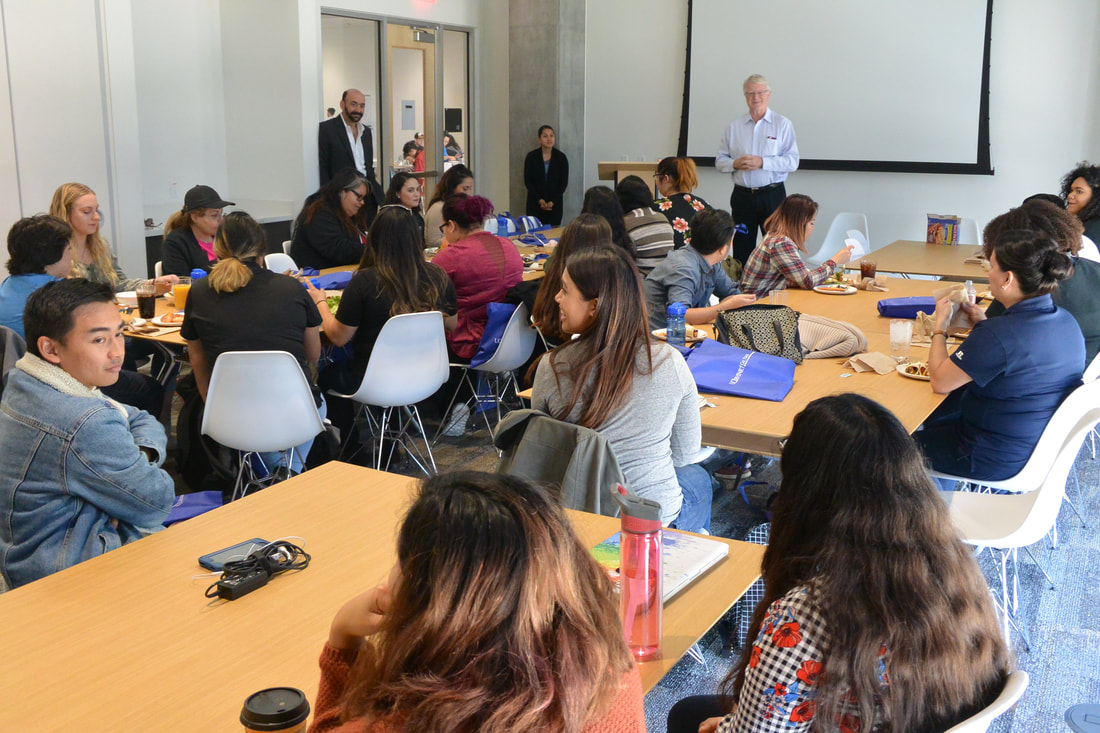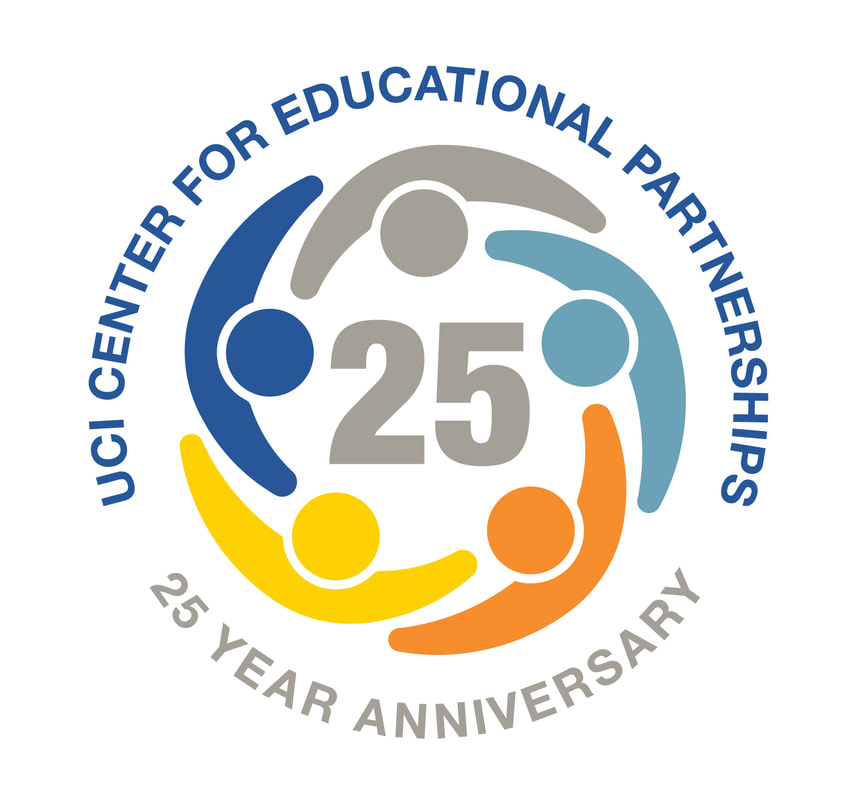THE STEM TEACHING PIPELINE STARTS HERE
|
In response to a growing and persistent need for well-prepared math and science teachers in underserved K-12 schools and communities, the University of California in 2005 established CalTeach.
While CalTeach exists on a few UC campuses, UCI CalTeach is unique among its counterparts. Whereas aspiring teachers in California typically enroll in a year-long post-baccalaureate institution to obtain their teaching credential, the UCI CalTeach program allows undergraduates majoring in a STEM field to earn both their bachelor’s degree and a teaching credential in four years. UCI CalTeach students graduate as in-demand ‘expert novices’, who are also equity-focused change agents, which engage students to critically discuss, present and develop agency to take action on issues they identify in their communities. “These are individuals who have graduated with degrees in fields such as chemistry and biology, and also have teaching experience,” said Doron Zinger, director of UCI CalTeach. |
Historically, UCI CalTeach students have worked at nearly 100 different K-12 schools across more than 50 different school districts, collectively serving thousands of students. They also persist and persevere in the teaching profession. Based on alumni reporting, 90 percent of UCI CalTeach alumni are still in the teaching profession today, whereas two-thirds of teachers nationwide leave the profession altogether before reaching retirement. Additionally, 70 percent of UCI CalTeach alumni are successfully teaching in low-income communities, whereas the teacher turnover rate in Title 1 schools is 50 percent higher than other schools.
“Our graduates persist at much higher rates than typical teachers, and most of our graduates teach in low-income, underserved communities across Orange, Riverside and Los Angeles counties,” Zinger said.
“Our graduates persist at much higher rates than typical teachers, and most of our graduates teach in low-income, underserved communities across Orange, Riverside and Los Angeles counties,” Zinger said.
|
The program does not stop at simply training science and math students to teach. It also supports future teachers to successfully develop innovative and culturally relevant curriculum for historically marginalized students, deviating from typical science curriculum that is rote and disconnected from students’ own lives. In a culturally relevant curriculum, students address important issues – from mental health to the racialized and inequitable consequences and responses to the COVID pandemic – and learn the science behind these issues, as well as what contributed to them and the social context that results in inequitable access and treatment.
Over the last two years, 45 percent of all UCI CalTeach graduates have been Latinx, and most have been first-generation college students and/or from low-income households. This is atypical for many teacher education programs, and highlights the program’s recruitment goals and deep level of student support. UCI CalTeach might have begun in 2005, but it had several precursors on the UCI campus and in CFEP. |
In 1997, CFEP implemented the UCOP-funded California Math Science Teaching (CMST) Initiative, which promoted STEM education and sought to increase the pipeline of future science and mathematics teachers in California. In 2002, CFEP received a $14.2 million National Science Foundation grant, FOCUS: Faculty Outreach Collaborations Uniting Scientists, Students, and Schools.
These programs provided collaborative opportunities for faculty, secondary math and science teachers, and undergraduates; hosted large-scale regional events and conferences; and funded a summer residential program for community college STEM majors interested in secondary math and science teaching.
Combined, they served as a model for both the creation of CalTeach, and the subsequent emulation of the program at other UC campuses.
“When we received CalTeach funding, we were able to expand upon all our previous efforts and reach even more students,” said Roslyn Soto, former associate director for CalTeach and currently Education Project Manager for the NASA Jet Propulsion Laboratory.
These programs provided collaborative opportunities for faculty, secondary math and science teachers, and undergraduates; hosted large-scale regional events and conferences; and funded a summer residential program for community college STEM majors interested in secondary math and science teaching.
Combined, they served as a model for both the creation of CalTeach, and the subsequent emulation of the program at other UC campuses.
“When we received CalTeach funding, we were able to expand upon all our previous efforts and reach even more students,” said Roslyn Soto, former associate director for CalTeach and currently Education Project Manager for the NASA Jet Propulsion Laboratory.
|
“UCI hosted the first and only community college summer residential program in the UC system, and we were the first UC to have a teaching-themed housing unit. It’s not surprising that UCI was then also the first UC to launch CalTeach, and that the program served as a model for CalTeach implementation at other UC campuses.”
In spring 2020, UCI CalTeach began offering the program’s introductory class to Orange Coast College students. UCI CalTeach will slowly expand offerings to OCC students, with the goal being to help the community college develop their own version of the early courses, which are transferable to UCI. UCI CalTeach is also working with Santiago Canyon College to write a Hispanic-Serving Institution (HSI) grant to recruit and prepare STEM majors at SCC. This includes establishing a summer STEM institute, in which SCC students teach students in an underserved school in the Orange Unified School District. |
“We want to focus on improving access to underrepresented students and creating pipelines to recruit community college students is vital in achieving that,” Zinger said.
Zinger also envisions adding a computer science curriculum to the UCI CalTeach program and, in the coming years, establishing a master’s degree in STEM Leadership and Teaching.
Zinger also envisions adding a computer science curriculum to the UCI CalTeach program and, in the coming years, establishing a master’s degree in STEM Leadership and Teaching.
The preceding story is part of the "CFEP: 25 Years of Impact" series, honoring the people, programs and partnerships that have helped impact millions of students, teachers and families over the past quarter century. View the entire series here.





